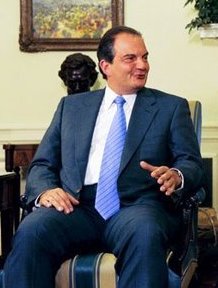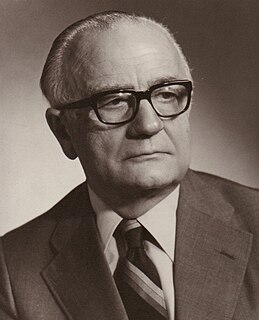| |||||||||||||||||||||||||||||||||||||||||||||||||||||||||||||||||
All 300 seats to the Greek Parliament 151 seats were needed for a majority | |||||||||||||||||||||||||||||||||||||||||||||||||||||||||||||||||
|---|---|---|---|---|---|---|---|---|---|---|---|---|---|---|---|---|---|---|---|---|---|---|---|---|---|---|---|---|---|---|---|---|---|---|---|---|---|---|---|---|---|---|---|---|---|---|---|---|---|---|---|---|---|---|---|---|---|---|---|---|---|---|---|---|---|
| |||||||||||||||||||||||||||||||||||||||||||||||||||||||||||||||||
| |||||||||||||||||||||||||||||||||||||||||||||||||||||||||||||||||
Parliamentary elections were held in Greece on 20 November 1977. [1] After Prime Minister Constantine Karamanlis called for early elections, his New Democracy party suffered a significant loss of power. However, Karamanlis managed to secure an absolute majority in the Parliament. The big surprise was the success of PASOK, whose socialistic rhetoric remained radical. Because of PASOK's success, the Centrists (Union of the Democratic Centre, ΕDIK, former Center Union - New Forces) led again by Georgios Mavros lost half of their power. As a result, Andreas Papandreou, PASOK's leader, became a prominent figure in Greek politics. The Communists (Communist Party of Greece) and the Nationalists managed to amplify their support.

Greece, officially the Hellenic Republic, self-identified and historically known as Hellas, is a country located in Southern and Southeast Europe, with a population of approximately 11 million as of 2016. Athens is the nation's capital and largest city, followed by Thessaloniki.

The New Democracy, also referred to as ND (ΝΔ) by its initials, is a liberal-conservative political party in Greece. In modern Greek politics, New Democracy has been the main centre-right political party and one of the two major parties along with its historic rival, the Panhellenic Socialist Movement (PASOK). Having spent two and a half years in government under the presidency of Antonis Samaras, New Democracy lost its majority in the Hellenic Parliament and became the major opposition party after the January 2015 legislative election.
The Union of the Democratic Centre is a centrist, liberal political party in Greece.
Contents
Future Prime Minister of Greece, Antonis Samaras first won a seat in parliament at this election.

The Prime Minister of the Hellenic Republic, colloquially referred to as the Prime Minister of Greece, is the head of government of the Hellenic Republic and the leader of the Greek cabinet. The incumbent prime minister is Alexis Tsipras, who took office on 21 September 2015.

Antonis Samaras is a Greek politician who was Prime Minister of Greece from 2012 to 2015 and leader of New Democracy from 2009 to 2015. Samaras previously served as Minister of Finance in 1989, as Minister of Foreign Affairs from 1989 to 1992, and as Minister of Culture and Sport in 2009.
















